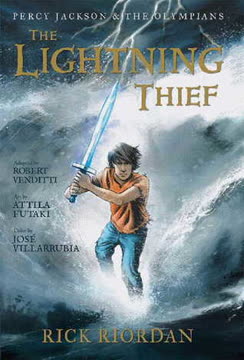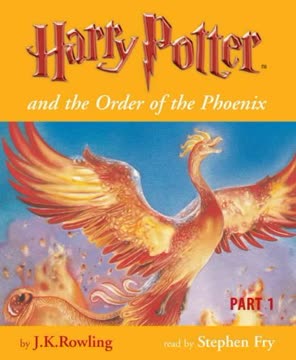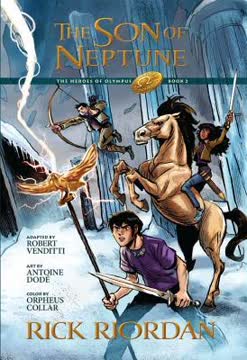Plot Summary
Percy Discovers His True Heritage
Percy Jackson, a twelve-year-old with a knack for trouble, attends Yancy Academy. During a field trip to the Metropolitan Museum of Art, he discovers his extraordinary lineage when he accidentally vaporizes his pre-algebra teacher, Mrs. Dodds, who is actually a monster. This shocking event reveals that Percy is a demigod, the son of Poseidon, the Greek god of the sea. This revelation thrusts Percy into a world of Greek mythology, setting him on a path to uncover his true identity and navigate the dangers that come with it.
A Dangerous Encounter at the Museum
At the museum, Percy is confronted by Mrs. Dodds, who transforms into a Fury, a fearsome creature from the Underworld. With the help of his Latin teacher, Mr. Brunner, who provides him with a pen that turns into a sword, Percy defeats Mrs. Dodds. This encounter leaves Percy bewildered and scared, as he realizes that the myths he learned in school are real and that he is somehow entangled in them. This marks the beginning of Percy's journey into a world filled with gods, monsters, and ancient prophecies.
The Mystery of Mrs. Dodds
After the museum incident, Percy is confused when no one else remembers Mrs. Dodds. His best friend, Grover, acts suspiciously, and Percy suspects that something is being hidden from him. As the school year progresses, Percy experiences more strange occurrences, including overhearing a conversation between Grover and Mr. Brunner about his safety. These events culminate in a terrifying bus ride where Percy encounters the Furies again, confirming that he is being hunted by creatures from Greek mythology.
A New World at Camp Half-Blood
Percy is taken to Camp Half-Blood, a sanctuary for demigods like him. Here, he meets other children of the gods and learns about his heritage. The camp is a place of training and safety, where demigods prepare for the challenges they will face in the mortal world. Percy discovers that his Latin teacher, Mr. Brunner, is actually Chiron, a centaur and trainer of heroes. He also meets Annabeth, a daughter of Athena, who becomes an important ally. At camp, Percy begins to understand the gravity of his situation and the role he must play in the ongoing conflict between the gods.
The Prophecy and the Quest
Percy learns of a prophecy that foretells his involvement in a quest to prevent a war among the gods. Zeus's master lightning bolt has been stolen, and Poseidon is accused of the theft. Percy is tasked with retrieving the bolt and returning it to Olympus before the summer solstice to prevent a catastrophic war. With the help of Annabeth and Grover, Percy sets out on a dangerous journey across the United States to the Underworld, where they believe the bolt is hidden. This quest will test Percy's courage, strength, and loyalty as he faces numerous challenges and discovers the true power of his heritage.
A Train Ride of Revelations
As Percy, Annabeth, and Grover travel by train, Percy dreams of a sinister voice from a pit, offering him a deal involving his mother. Annabeth shares her strained relationship with her father, revealing her deep-seated resentment. The trio's journey is fraught with tension as they grapple with the implications of Percy's dream and the looming threat of the Underworld.
The Arch and the Chimera
In St. Louis, Percy faces a Chimera and its mother, Echidna, atop the Gateway Arch. The battle is fierce, and Percy is poisoned by the Chimera's serpent tail. In a desperate move, he jumps into the Mississippi River, where he discovers his ability to breathe underwater and receives a cryptic message from a water spirit, urging him to visit Santa Monica before descending into the Underworld.
Ares's Proposition and a Trap
In Denver, the god of war, Ares, tasks Percy with retrieving his shield from a water park. The task is a trap set by Hephaestus to embarrass Ares and Aphrodite. Percy and his friends narrowly escape a broadcasted spectacle of mechanical spiders and a collapsing ride, realizing the gods' manipulations and the stakes of their quest.
A Ride with Wild Animals
Ares provides a ride west in a truck filled with mistreated zoo animals. Percy, Annabeth, and Grover free the animals, who are blessed by Grover to find safety. The trio reflects on their journey and the gods' influence, with Grover revealing his past failure to protect Thalia, Zeus's daughter, adding weight to their mission.
The Lotus Casino's Temptation
In Las Vegas, the trio is ensnared by the Lotus Casino, a place designed to trap visitors in eternal leisure. Realizing they've lost five days, they escape the casino's allure, driven by the urgency of their quest and the looming deadline of the summer solstice.
A Final Confrontation with Ares
In Santa Monica, Percy confronts Ares, who reveals his role in the theft of Zeus's bolt and Hades's helm. Ares, manipulated by a darker force, fights Percy, who uses his connection to the sea to defeat the god. The victory is bittersweet, as Percy realizes the true enemy lies deeper than Ares's schemes.
The Truth Unveiled on Olympus
Returning the bolt to Zeus on Olympus, Percy learns of the true threat: Kronos, the Titan lord, is stirring. Poseidon acknowledges Percy as his son, but warns of the tragic fate of heroes. Percy faces a choice between returning to his mortal life or staying at Camp Half-Blood, understanding the weight of his lineage and the prophecy that looms over him.
Characters
Percy Jackson
Percy Jackson is a twelve-year-old boy who discovers he is a demigod, the son of Poseidon. He struggles with dyslexia and ADHD, which are revealed to be traits common among demigods. Percy's journey begins when he learns of his true heritage and is thrust into a world of gods and monsters. He is brave, loyal, and determined to prove himself, especially in the eyes of his father, whom he has never met. Percy's character is defined by his courage and his desire to protect his friends and family.
Annabeth Chase
Annabeth is a daughter of Athena, the goddess of wisdom and battle strategy. She has been at Camp Half-Blood since she was seven and is eager to prove herself on a quest. Annabeth is intelligent, resourceful, and fiercely independent. She becomes one of Percy's closest allies and helps him navigate the challenges of being a demigod. Her knowledge of Greek mythology and her strategic mind are invaluable to Percy on his quest.
Grover Underwood
Grover is a satyr, a creature with the upper body of a human and the lower body of a goat. He is Percy's best friend and protector, tasked with guiding him to Camp Half-Blood. Grover dreams of becoming a searcher, a satyr who seeks the lost god Pan. Despite his insecurities, Grover is brave and loyal, always ready to support Percy on his journey. His connection to nature and his ability to communicate with animals are crucial to their quest.
Chiron
Chiron is a centaur and the activities director at Camp Half-Blood. He is a legendary trainer of heroes and serves as a mentor to Percy. Chiron is knowledgeable and patient, guiding Percy as he learns about his heritage and the responsibilities of being a demigod. He provides Percy with the tools and training he needs to succeed on his quest.
Ares
Ares's involvement in the theft of the bolt and helm reveals his desire for chaos and conflict. His defeat by Percy exposes his vulnerability and the influence of a darker force manipulating him.
Hades
Hades is initially perceived as the antagonist, but it becomes clear he is also a victim of the theft. His desire for his helm and the truth about his intentions add complexity to his character.
Mr. D (Dionysus)
Mr. D, also known as Dionysus, is the god of wine and the director of Camp Half-Blood. He is not particularly fond of his role and often appears grumpy and disinterested. Despite his demeanor, Mr. D is a powerful god who enforces the rules of the camp. His presence serves as a reminder of the gods' influence over the demigods' lives.
Plot Devices
The Prophecy
The prophecy is a central plot device that sets Percy on his journey. It foretells a quest that will determine the fate of the gods and the mortal world. The prophecy is cryptic and open to interpretation, creating tension and uncertainty for Percy and his friends. It serves as a driving force for the narrative, motivating Percy to take on challenges and uncover the truth behind the theft of Zeus's lightning bolt.
The Mist
The Mist is a magical force that obscures the true nature of the world from mortals. It allows demigods and mythical creatures to exist in the mortal world without being detected. The Mist is a crucial plot device that explains why mortals are unaware of the gods and monsters around them. It also highlights the unique perspective of demigods like Percy, who can see through the Mist and perceive the world as it truly is.
The Pearls
The pearls, gifted by a Nereid, serve as a crucial escape mechanism for Percy and his friends. Their use underscores the theme of sacrifice and the difficult choices Percy must make to fulfill his quest.
Analysis
"The Lightning Thief: The Graphic Novel" explores themes of identity, courage, and the struggle between good and evil. Through Percy's journey, the story delves into the complexities of growing up and discovering one's true self amidst external challenges. The narrative intertwines Greek mythology with modern life, creating a rich tapestry that highlights the timeless nature of these myths. The book emphasizes the importance of friendship, loyalty, and the courage to face one's fears. It also reflects on the consequences of power and the responsibilities that come with it, offering readers a compelling tale of adventure and self-discovery.
Last updated:
FAQ
Synopsis & Basic Details
What is The Lightning Thief: The Graphic Novel about?
- A Demigod's Awakening: The Lightning Thief: The Graphic Novel introduces Percy Jackson, a troubled twelve-year-old who discovers he is a demigod, the son of the Greek god Poseidon. His life is upended when he accidentally vaporizes his pre-algebra teacher, revealing a hidden world of mythological creatures and divine conflicts.
- Quest to Prevent War: Accused of stealing Zeus's master lightning bolt, Percy embarks on a perilous cross-country quest with his friends, Annabeth Chase (daughter of Athena) and Grover Underwood (a satyr). Their mission is to find the stolen bolt and Hades's Helm of Darkness before the summer solstice, preventing a catastrophic war between the Olympian gods.
- Journey of Self-Discovery: As Percy navigates encounters with monsters, gods, and ancient traps, he uncovers truths about his heritage, his friends' pasts, and a deeper, more sinister plot orchestrated by a powerful, ancient entity. The narrative is a thrilling adventure that blends Greek mythology with modern American life, exploring themes of identity, loyalty, and destiny.
Why should I read The Lightning Thief: The Graphic Novel?
- Visually Engaging Mythology: The graphic novel format brings the vibrant world of Greek mythology to life with dynamic illustrations, making complex characters and epic battles more accessible and exciting. It offers a fresh, immersive way to experience Rick Riordan's beloved story, enhancing the reader's understanding of the mythological elements.
- Relatable Hero's Journey: Percy's struggles with ADHD, dyslexia, and feeling like an outcast resonate deeply, transforming his perceived weaknesses into demigod strengths. His journey of self-acceptance and growth, from a confused kid to a courageous hero, provides a powerful and inspiring narrative for young readers.
- Deeper Thematic Exploration: Beyond the adventure, the graphic novel subtly explores themes of dysfunctional family dynamics (both mortal and divine), environmentalism through Grover's perspective, and the timeless nature of power and betrayal. It encourages readers to look beyond the surface and consider the deeper meanings embedded in the narrative.
What is the background of The Lightning Thief: The Graphic Novel?
- Modern Mythological Adaptation: The graphic novel is an adaptation of Rick Riordan's best-selling novel, The Lightning Thief, which reimagines ancient Greek myths in a contemporary American setting. This intertextual approach grounds the fantastical elements in a relatable, modern context, making the gods and monsters feel immediate and relevant.
- Cultural Commentary on Society: The story subtly critiques modern society through its portrayal of the gods' current residence in America ("the heart of the West") and their continued influence on human events. It touches on environmental concerns through Grover's character and the pervasive nature of media and consumerism (e.g., the Lotus Casino, Smelly Gabe's TV appearances).
- Educational Undercurrents: While an adventure story, the narrative is steeped in classical education, particularly Greek and Roman mythology. Chiron's role as a Latin teacher and the demigods' inherent understanding of Ancient Greek highlight the idea that these ancient stories are not just myths but living histories that continue to shape the world.
What are the most memorable quotes in The Lightning Thief: The Graphic Novel?
- "Look, I didn't want to be a half-blood.": This opening line immediately establishes Percy's reluctant hero status and sets a relatable, informal tone for the entire narrative. It encapsulates his initial denial and the unexpected burden of his heritage, a core theme in The Lightning Thief analysis.
- "Monsters don't die, Percy. They can be killed. But they don't die.": Annabeth's chilling explanation of monster immortality reveals the cyclical nature of conflict in the demigod world, emphasizing the endless struggle heroes face. This quote is pivotal for understanding the stakes and the enduring threat in The Lightning Thief themes.
- "You will be betrayed by one who calls you a friend. And you shall fail to save what matters most, in the end.": The prophecy's prophecy, particularly these two lines, creates profound suspense and foreshadowing, driving Percy's internal conflict and external vigilance throughout his quest. This ambiguous prophecy is central to The Lightning Thief ending explained and interpretive debates.
What writing style, narrative choices, and literary techniques does Robert Venditti use?
- First-Person, Relatable Voice: The narrative is told from Percy Jackson's perspective, maintaining his sarcastic, observant, and often humorous voice from the original novel. This choice allows readers to experience the fantastical events through the eyes of a relatable, imperfect protagonist, enhancing the story's accessibility and emotional impact.
- Dynamic Visual Storytelling: As a graphic novel, Venditti (and the artists) employs sequential art to convey action, emotion, and setting. Panel layouts, character expressions, and visual metaphors (e.g., the glowing trident for Poseidon's claim, the shifting forms of monsters) are crucial narrative choices that immerse the reader in Percy's world and deepen the symbolism in The Lightning Thief.
- Subtle Foreshadowing and Irony: The narrative frequently uses subtle hints and dramatic irony, especially concerning character identities and future events. Percy's initial obliviousness to the true nature of Mr. Brunner or Grover, and the prophecy's cryptic pronouncements, build suspense and allow for satisfying reveals, enriching the analysis of The Lightning Thief plot.
Hidden Details & Subtle Connections
What are some minor details that add significant meaning?
- Chiron's Red Umbrella: This seemingly mundane detail, "A red umbrella stuck up from the back of his chair, making it look like a motorized café table," subtly hints at Chiron's true nature as a centaur. The umbrella, a common human accessory, contrasts humorously with the magical wheelchair, foreshadowing his fantastical form and the hidden reality of Camp Half-Blood.
- Gabe's "Smell" as a Shield: Grover reveals that Gabe's repulsive human scent "could mask the presence of any demigod," explaining why Sally stayed with him. This detail transforms Gabe from a mere antagonist into a crucial, albeit unwitting, protective barrier for Percy, adding a layer of tragic sacrifice to Sally's character and her motivations.
- The "Eta" Symbol in Waterland: Annabeth's observation of the Greek letter "Eta" (H) carved on the Cupid statues and the boat in Waterland is a clever, subtle clue to Hephaestus's trap. This detail highlights Annabeth's sharp intellect and her Athena heritage, demonstrating how her knowledge of ancient Greek is a practical skill in the demigod world.
What are some subtle foreshadowing and callbacks?
- Luke's Scar and Bitterness: Luke's "thick white scar that ran from just beneath his right eye to his jaw" and his early bitterness about the gods ("Once you start believing in them? It doesn't get any easier") subtly foreshadow his eventual betrayal and his resentment towards the Olympians. This detail hints at his deeper motivations and the influence of Kronos, which is revealed later in The Lightning Thief analysis.
- The Fates' Yarn Snipping: The scene with the three old ladies knitting and snipping yarn on the bus stop is a direct, yet initially cryptic, foreshadowing of death. Grover's panic and his later explanation that "They only do that when you're about to … when someone's about to die" immediately raises the stakes for Percy, linking his journey to ancient Greek concepts of destiny and mortality.
- Percy's Underwater Abilities: Early instances of Percy's connection to water, such as the "wave roared in my ears" when Nancy Bobofit is pushed into the fountain, or his healing in the creek during capture the flag, subtly foreshadow his identity as a son of Poseidon. These moments build anticipation for his divine parentage reveal and the full extent of his powers.
What are some unexpected character connections?
- Ares and Aphrodite's Secret Affair: The "Thrill Ride O' Love" at Waterland reveals the long-standing, scandalous affair between Ares and Aphrodite, and Hephaestus's elaborate trap to expose them. This detail highlights the complex and often petty interpersonal dynamics among the Olympians, showing that even gods are subject to human-like drama and revenge, adding depth to themes in The Lightning Thief.
- Luke's Role in Thalia's Fate: The revelation that Luke was one of the demigods Thalia sacrificed herself for, and his subsequent bitterness, creates a tragic backstory that explains his deep-seated resentment towards the gods. This connection adds a layer of pathos to Luke's character, making his betrayal more complex than simple villainy and providing insight into his motivations.
- Hades's Unexpected Victimhood: Initially presented as the prime suspect, Hades is revealed to be a victim of the theft himself, having lost his Helm of Darkness. This unexpected twist subverts reader expectations and complicates the conflict, showing that the "villain" is also being manipulated, which is crucial for The Lightning Thief ending explained.
Who are the most significant supporting characters?
- Smelly Gabe Ugliano: Beyond being a crude stepfather, Gabe serves as an unwitting protective shield for Percy due to his strong, repulsive human scent that masks Percy's demigod aura. His presence, though unpleasant, inadvertently kept Percy safe from monsters for years, highlighting Sally's sacrifice and the hidden dangers of the demigod world.
- Charon, Ferryman of the Dead: Charon is portrayed not just as a mythical figure but as a disgruntled civil servant of the Underworld, obsessed with Italian suits and a pay raise. His human-like grievances and the transactional nature of passage to the afterlife add a darkly humorous and bureaucratic layer to the concept of death, making the Underworld feel surprisingly mundane yet still formidable.
- Echidna, Mother of Monsters: Echidna's brief but impactful appearance as the mother of the Chimera (and other monsters) emphasizes the pervasive and familial nature of the threats demigods face. Her personal vendetta against Athena (Annabeth's mother) highlights the ancient grudges that fuel the mythological conflicts, connecting the heroes' personal struggles to a larger, timeless war.
Psychological, Emotional, & Relational Analysis
What are some unspoken motivations of the characters?
- Percy's Search for Belonging: Beyond finding the bolt, Percy's deepest unspoken motivation is to find a place where he belongs and to understand his identity. His initial misery in Cabin Three, despite having it to himself, shows his longing for acceptance and community, a core aspect of his character development and psychological complexity.
- Annabeth's Quest for Parental Approval: Annabeth's intense drive for a quest and her desire to build something lasting ("the greatest monument to the gods") stem from a deep-seated need for her mother Athena's approval and a way to prove her worth, especially given her troubled relationship with her mortal father. This reveals her underlying emotional vulnerability.
- Grover's Redemption Arc: Grover's desperate desire for a searcher's license is fueled by his guilt over Thalia's death. His unspoken motivation is to redeem himself and prove his courage, not just to the Council of Cloven Elders, but to himself, showcasing his profound loyalty and the emotional weight he carries.
What psychological complexities do the characters exhibit?
- Percy's ADHD as a Superpower: Percy's ADHD and dyslexia, initially presented as learning disabilities, are recontextualized as inherent demigod traits—battlefield reflexes and a mind wired for Ancient Greek. This reframing offers a powerful message about neurodiversity, turning perceived weaknesses into unique strengths and contributing to Percy's psychological analysis.
- Annabeth's Trauma and Resilience: Annabeth's extreme fear of spiders, rooted in the Arachne myth and her mother's rivalry, reveals a deep-seated trauma despite her outward bravery and strategic mind. Her ability to function and lead despite this phobia showcases her remarkable resilience and the psychological toll of being a demigod.
- Luke's Disillusionment and Resentment: Luke's transformation into a betrayer is driven by profound disillusionment with the gods, particularly his father Hermes, whom he feels undervalued him. His scar, a physical manifestation of a failed quest, symbolizes his internal wounds and the psychological burden of unmet expectations, leading to his radical motivations.
What are the major emotional turning points?
- Percy's Mother's "Death": Sally Jackson's apparent dissolution into golden light after the Minotaur attack is a devastating emotional turning point for Percy. It fuels his initial rage and determination to reach the Underworld, providing a powerful personal stake in the quest beyond just retrieving the bolt. This event shapes Percy's emotional analysis throughout the journey.
- The Lotus Casino's Allure: The Lotus Casino represents a significant emotional challenge, tempting the heroes with endless pleasure and the erasure of their quest's urgency. Their escape from its seductive influence marks a turning point where they reaffirm their commitment to their mission and the importance of their memories and responsibilities.
- Percy's Confrontation with Ares: Percy's decision to fight Ares directly, despite being outmatched, is a pivotal emotional moment. It signifies his refusal to be a pawn, his growing self-confidence, and his willingness to stand up to divine authority, demonstrating his courage and solidifying his identity as a hero. This battle is key to Percy Jackson's character development.
How do relationship dynamics evolve?
- Rivalry to Partnership (Percy & Annabeth): Percy and Annabeth's relationship evolves from initial rivalry and suspicion ("You drool when you sleep," "seaweed brain," "wise girl") to a deep, trusting partnership. Their shared experiences and mutual reliance on the quest forge an unbreakable bond, demonstrating the power of friendship and cooperation in overcoming challenges.
- Protector to Equal (Grover & Percy): Grover initially acts as Percy's nervous protector, burdened by past failures. As the quest progresses, Percy's growing powers and leadership allow Grover to shed some of his insecurities, culminating in Percy's heartfelt affirmation of Grover's courage and worth. Their dynamic shifts from a guardian-ward relationship to one of mutual respect and equal partnership.
- Dysfunctional Family Bonds (Olympians): The graphic novel highlights the deeply dysfunctional family dynamics among the Olympians, particularly Zeus, Poseidon, and Hades. Their ancient grudges, petty squabbles, and broken oaths drive the central conflict, showing that even divine power doesn't guarantee healthy relationships. This provides a critical analysis of themes in The Lightning Thief related to power and family.
Interpretation & Debate
Which parts of the story remain ambiguous or open-ended?
- The Full Extent of Kronos's Influence: While Kronos is revealed as the ultimate manipulator, the full scope of his power and how he communicates with and influences demigods (like Luke) through dreams remains somewhat ambiguous. The narrative hints at his growing strength ("He's healing," "He's coming back") but leaves the specifics of his resurgence and future plans open-ended, setting up future conflicts in the series.
- The Prophecy's Final Line: The line "And you shall fail to save what matters most, in the end" is deliberately ambiguous. While Percy initially interprets it as failing to save his mother, her eventual return complicates this. The true "what matters most" could be Western Civilization, his friends, or even his own innocence, leaving its ultimate meaning open to reader interpretation and debate.
- The Gods' True Intentions: The motivations of the Olympians, particularly Zeus and Poseidon, remain somewhat opaque. While they are powerful, they are also portrayed as flawed and self-serving. The extent to which they genuinely care for their children or are simply using them as pawns in their eternal power struggles is left for the reader to ponder, fueling interpretive debates about divine morality.
What are some debatable, controversial scenes or moments in The Lightning Thief: The Graphic Novel?
- Ares's Manipulation vs. Inherent Evil: A key debate revolves around Ares's role. Was he truly a willing participant in Kronos's scheme, driven by his own desire for war, or was he merely a pawn, manipulated by a greater force? Percy's observation that Ares seemed "listening to another voice, deep inside his head" suggests manipulation, but his inherent nature as the god of war makes his actions seem plausible regardless, sparking Ares motivation analysis.
- The Gods' Parenting Styles: The portrayal of the Olympian gods as absentee or neglectful parents is a controversial aspect. While it serves to make the demigods more relatable, it raises questions about divine responsibility and the ethics of siring children only to abandon them. Annabeth's resentment towards her father and Luke's ultimate betrayal highlight the negative consequences of this divine detachment, prompting themes in The Lightning Thief discussions on family.
- Percy's Decision Regarding Smelly Gabe: Percy's choice to leave the Medusa head with his mother, allowing her to deal with Gabe, rather than directly intervening, is debatable. While it empowers Sally, some might argue it's a morally ambiguous act of indirect violence. This moment forces Percy to grapple with the consequences of his actions and the nature of heroism, moving beyond simple "good vs. evil" and adding depth to Percy Jackson's character development.
The Lightning Thief: The Graphic Novel Ending Explained: How It Ends & What It Means
- The Bolt's Return & Kronos's Revelation: Percy successfully returns Zeus's master bolt, preventing the immediate war between Zeus and Poseidon. However, the true antagonist is revealed to be Kronos, the Titan Lord, who manipulated Ares and Luke to steal the bolt and Helm of Darkness, aiming to spark a war that would weaken the Olympians and allow his own resurgence from Tartarus. This twist redefines the central conflict, shifting it from a divine squabble to an ancient, cosmic threat.
- Luke's Betrayal and the Prophecy's Truth: Luke Castellan is revealed as the true traitor, having been corrupted by Kronos. He confesses to stealing the bolt and helm and attempts to poison Percy with a pit scorpion. This fulfills the prophecy's prophecy, "You shall be betrayed by one who calls you a friend," adding a tragic layer to Percy's first quest and highlighting the insidious nature of Kronos's influence.
- Percy's Choice and Sally's Empowerment: Percy chooses to return to the mortal world for the school year, rather than staying at Camp Half-Blood year-round, signifying his desire for a semblance of a normal life and his commitment to his mother. Sally Jackson, empowered by Percy's gift (Medusa's head, which she uses to turn Gabe into a statue), finally frees herself from her abusive husband, pursuing her dreams of writing and art. This ending emphasizes themes of self-determination, personal growth, and the idea that heroism isn't just about fighting monsters, but also about making difficult personal choices and empowering others.
Review Summary
Readers have mixed opinions on The Lightning Thief graphic novel adaptation. While some appreciate the quick, nostalgic read and faithful plot, many criticize the rushed storytelling, omitted details, and disappointing artwork. Common complaints include characters looking too old, lack of Percy's humor, and loss of the original book's charm. Some find it a good introduction for reluctant readers or fans seeking a refresher, but others strongly prefer the original novel. Overall, the adaptation receives mediocre ratings, with fans divided on its merits.
Camp Half-Blood Chronicles Series
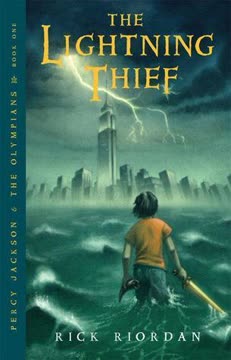
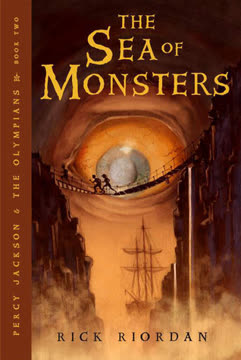
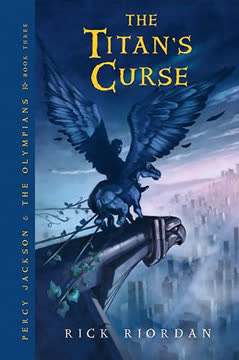
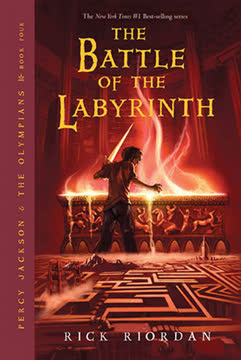
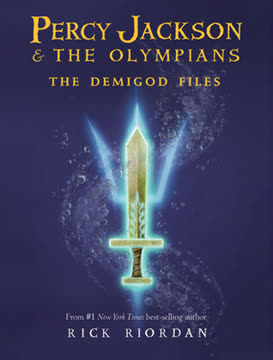
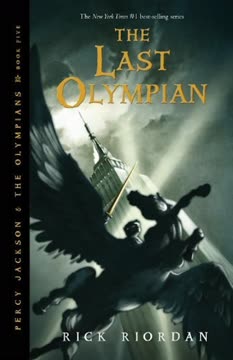
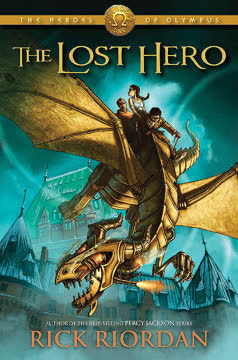
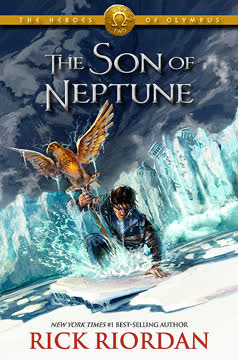
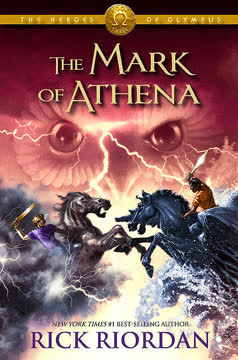
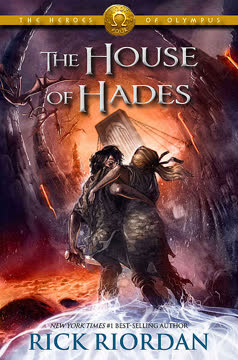
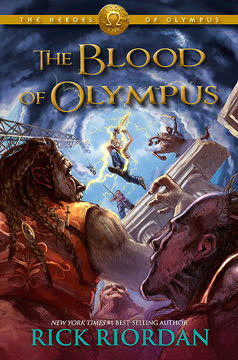
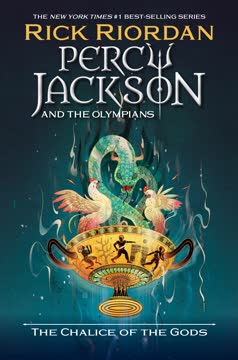
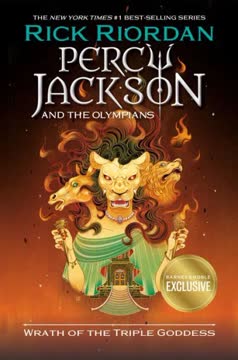
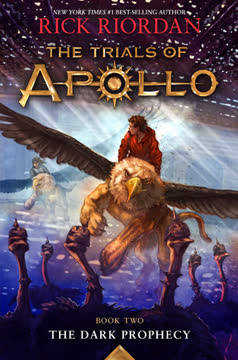
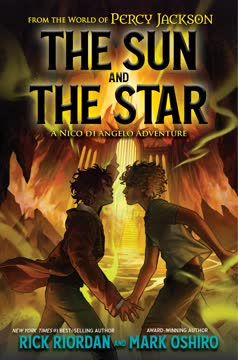
Similar Books
Download PDF
Download EPUB
.epub digital book format is ideal for reading ebooks on phones, tablets, and e-readers.
